You should call an emergency plumber when you notice severe leaks, overflowing toilets, or significant water damage. If multiple drains clog simultaneously, it could signal a main sewer line blockage requiring immediate attention. Burst pipes demand rapid action; shutting off the water supply is vital to prevent further damage. If water stains appear or mold begins to grow, professional help is critical. For serious issues beyond DIY fixes, trust the experts to handle the repair safely. Being aware of these indicators will help protect your home, and you'll find even more crucial tips for effective emergency response.
Key Takeaways
- Call an emergency plumber for severe leaks from burst pipes to prevent extensive damage and flooding.
- If you experience overflowing toilets that cannot be resolved with a plunger, seek immediate professional assistance.
- Persistent slow drains or recurring clogs may indicate deeper issues; don't hesitate to contact a plumber if DIY fixes fail.
- Uncontrollable water flow or significant water damage requires immediate professional intervention to minimize risks.
- If you are unsure about handling plumbing issues or lack the necessary tools, it's best to call an expert.
Signs of a Plumbing Emergency
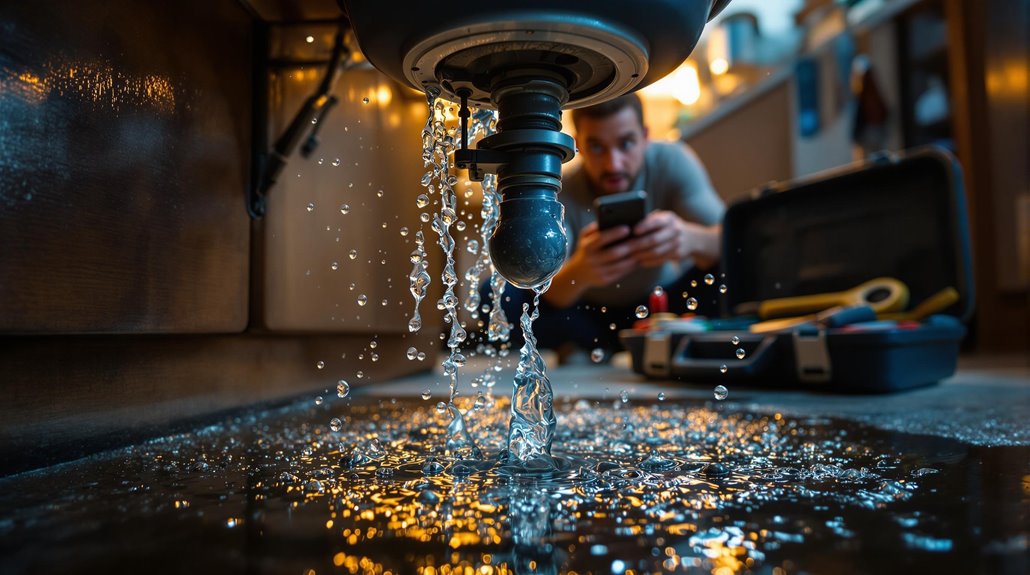
When you notice sudden changes in your plumbing, it's vital to identify the signs of a plumbing emergency. One clear indicator is clogged drains, particularly if multiple fixtures are affected simultaneously. This often signals a blockage in the main sewer line that requires immediate attention. Furthermore, leaking faucets can escalate quickly, leading to water damage and increased utility bills. If you observe steady dripping or pooling water, it's important to act promptly. Unusual noises from pipes, water discoloration, or unexplained wet spots in your home are likewise red flags. Recognizing these signs early can prevent more extensive damage and costly repairs. Emergency plumbing services are available 24/7 to help you address these urgent issues. Don't hesitate to reach out for professional help when you encounter these problems.
Common Plumbing Emergencies
While many plumbing issues can be managed with minor repairs, some situations demand immediate professional intervention. Common plumbing emergencies include severe leaks, such as those from burst pipes or malfunctioning water heaters. A leaky faucet might seem minor, but if it's causing significant water accumulation, it can escalate into a larger issue. Furthermore, if your water heater is leaking or not providing hot water, it's vital to act quickly, as this can lead to further damage or even mold growth. Clogs that cause overflowing toilets or sewage backups likewise require immediate attention. Recognizing these emergencies can save you time and money, ensuring your home remains safe and functional. Don't hesitate to call a professional when faced with these urgent plumbing situations. Additionally, prompt action can help prevent further damage risks associated with water intrusion in your home.
Assessing Water Damage
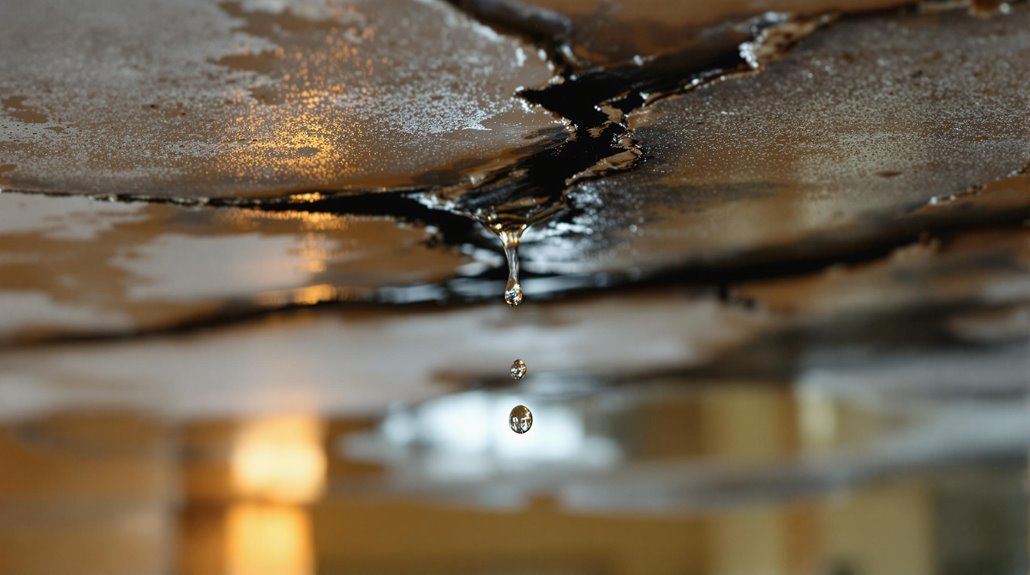
After addressing a plumbing emergency, the next step is evaluating any water damage that may have occurred. Start with water stain identification; check walls, ceilings, and floors for discoloration. Document the stains to determine their severity. Next, conduct a mold growth assessment. Mold can develop quickly in damp areas, so inspect for any musty odors or visible growth.
Here's a quick reference table:
| Type of Damage | Action Required |
|---|---|
| Water Stains | Identify source, document |
| Peeling Paint | Remove affected paint, dry area |
| Warped Flooring | Replace damaged sections |
| Mold | Clean with appropriate solution |
Taking these steps promptly can prevent further damage and costly repairs.
Burst Pipes: Immediate Actions
When you uncover a burst pipe, your first step is to shut off the water supply immediately to prevent further damage. Next, assess the damage quickly to determine the extent of the leak and what might be salvageable. Acting fast can minimize the impact on your property and ease a smoother repair process.
Shut Off Water Supply
If you find burst pipes in your home, the first critical step is to shut off the water supply immediately. Locate your main water valve, usually found near the perimeter of your home, in basements, crawl spaces, or near the water meter. Familiarize yourself with water valve locations beforehand, as this knowledge will save you time during emergencies. Once you've identified the valve, follow emergency shutoff procedures: turn the valve clockwise until it stops. If you can't access the main valve, consider shutting off individual valves for affected areas, such as sinks or toilets. This quick action can greatly minimize water damage and prevent further complications, allowing you to manage the situation effectively until professional help arrives.
Assess Damage Quickly
While dealing with burst pipes, quickly evaluating the damage is crucial to mitigating further issues. Begin your damage assessment by checking the affected area for water saturation, mold growth, or structural concerns. A quick response can limit potential hazards and minimize repair costs.
Here's a quick checklist to guide your assessment:
| Damage Indicator | Action Required |
|---|---|
| Water pooling | Remove standing water |
| Wall discoloration | Inspect for hidden leaks |
| Mold growth | Dry the area and ventilate |
| Structural sagging | Contact a structural expert |
| Electrical issues | Turn off power immediately |
Overflowing Toilets: What to Do
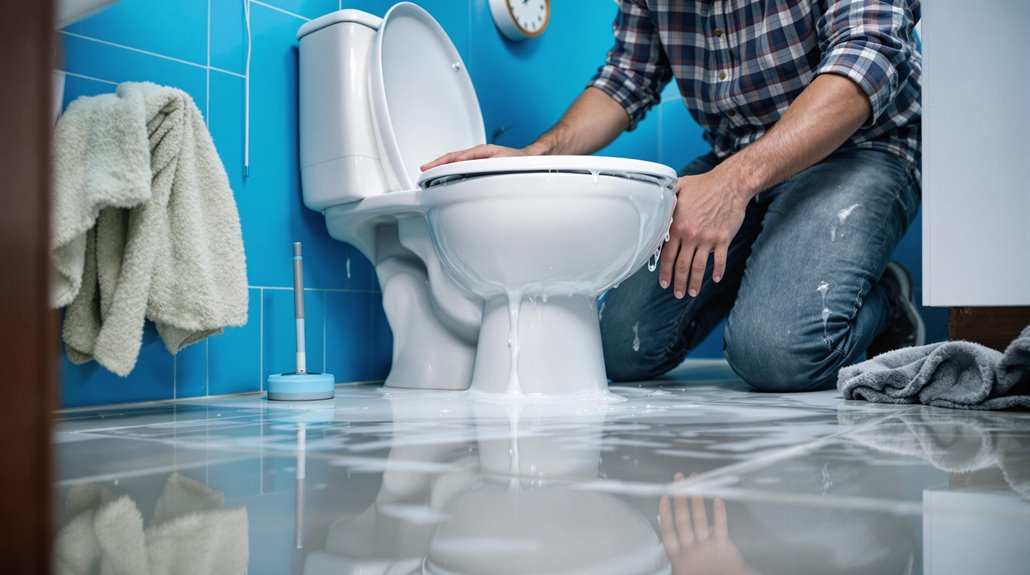
An overflowing toilet can quickly turn from a minor inconvenience to a major disaster in your home. If you find yourself in this situation, follow these steps for effective emergency toilet solutions:
- Shut Off the Water Supply: Locate the shut-off valve behind the toilet and turn it clockwise to stop the flow of water.
- Clear the Area: Remove any items around the toilet to prevent water damage and create a safe workspace.
- Use a Plunger: Firmly plunge the toilet to dislodge any blockage.
Gas Leaks and Plumbing Issues
Gas leaks can pose serious risks to your safety, so it's essential to recognize their signs, such as a distinct odor or unusual hissing sounds. If you suspect a leak, take immediate safety precautions like evacuating the area and avoiding any ignition sources. Contact a professional plumber or gas technician right away to address the issue effectively.
Recognizing Gas Leak Signs
How can you tell if there's a gas leak in your home? Recognizing the signs early is vital for your safety. Implementing effective gas detection methods can help you identify potential leaks. Here are three key indicators to watch for:
- Odor: A sulfur-like smell, often described as rotten eggs, signals a gas leak.
- Hissing Sounds: Listen for any unusual hissing or whistling noises near gas appliances or pipes.
- Dead Vegetation: If plants near your gas line are wilting or dying without explanation, it might indicate a leak.
If you notice any of these signs, follow appropriate safety protocols immediately. Don't hesitate to contact a professional to assess the situation and guarantee your home remains safe.
Immediate Safety Precautions
When you suspect a gas leak or face plumbing issues, taking immediate safety precautions is crucial to protect yourself and your home. First, grab your emergency checklist to guarantee you cover all critical steps. If you smell gas, evacuate the area immediately, avoiding any actions that could create a spark, such as flipping switches. When dealing with plumbing issues like flooding, turn off the main water supply to prevent further damage. Equip yourself with safety gear, including gloves and goggles, to protect against potential hazards. Maintain proper ventilation if you're in a confined space. Always prioritize your safety and the safety of others before attempting any fixes or contacting help. Your quick actions can make all the difference in an emergency.
When to Contact Help
If you notice a strong odor of gas or experience significant plumbing issues, it's vital to contact a professional immediately. Quick action can prevent potential disasters. To improve your homeowner preparedness, keep this emergency checklist in mind:
- Gas Leaks: If you smell gas, evacuate the area, avoid using electrical devices, and call the gas company.
- Burst Pipes: If a pipe bursts, turn off your water supply and contact a plumber to minimize water damage.
- Sewage Backups: If you notice sewage backing up, avoid using water fixtures and call an emergency plumber to address the issue.
Being aware of these situations guarantees you're ready to respond promptly. Don't hesitate to reach out for help when safety is at stake.
Severe Clogs and Backups
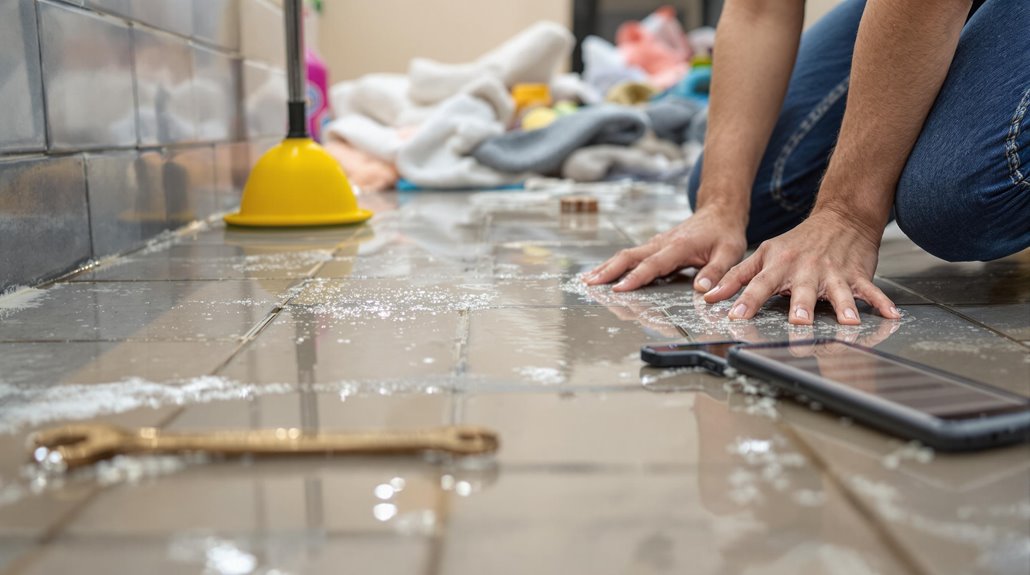
Severe clogs and backups can create significant disruptions in your plumbing system, leading to potential water damage and health hazards. If you notice slow-draining sinks, gurgling toilets, or water pooling in unexpected areas, it's time to take action. These signs often indicate a blockage that regular drain cleaning methods can't resolve. Ignoring these issues can escalate into more extensive plumbing problems, requiring costly repairs. Regular plumbing maintenance is crucial in preventing severe clogs; nonetheless, when they do occur, you shouldn't hesitate to call an emergency plumber. They have the tools and expertise to quickly identify and resolve deep-rooted blockages, ensuring your plumbing system functions properly and minimizing further damage. Act promptly to protect your home and health.
When to DIY vs. Call
When deciding whether to tackle a plumbing issue yourself or call a professional, you need to assess the severity of the problem. Consider whether you have the necessary tools and skills to address the situation effectively. Furthermore, evaluate the time sensitivity of the issue, as some problems require immediate attention to prevent further damage.
Assessing Severity of Issue
How can you determine whether a plumbing issue requires professional intervention or can be resolved with a DIY approach? Start by evaluating the emergency symptoms and classifying the issue. Consider the following:
- Severity: If water is gushing uncontrollably or if you notice significant flooding, it's time to call a professional.
- Duration: Persistent problems like slow drains or minor leaks might be manageable with DIY fixes, but don't ignore them for too long.
- Skill Level: If you're unsure about handling the plumbing issue safely, it's best to call in an expert.
Required Tools and Skills
Understanding the required tools and skills is vital in deciding whether to tackle a plumbing issue yourself or call a professional. If you choose to DIY, you'll need basic plumbing tools, such as a pipe wrench, plunger, and adjustable wrench. Familiarity with these tools can empower you to handle minor leaks or clogs. On the other hand, emergency skills are indispensable for more complex issues, like burst pipes or sewage backups. If you lack experience or the right tools, it's wiser to call an emergency plumber. They possess specialized equipment and expertise to resolve problems swiftly and safely. Weigh your confidence and capabilities against the severity of the situation to make the best choice for your home.
Time Sensitivity Consideration
Evaluating the urgency of a plumbing issue can greatly influence your decision to tackle it yourself or call a professional. Effective time management and a thorough urgency assessment can save you both time and money. Consider these factors:
- Severity: If it's a minor leak that you can easily contain, DIY might be appropriate.
- Location: Issues in critical areas like the kitchen or bathroom require immediate attention and likely a professional.
- Potential Damage: If you suspect extensive damage or flooding, call an emergency plumber right away to prevent further complications.
Preparing for the Plumber
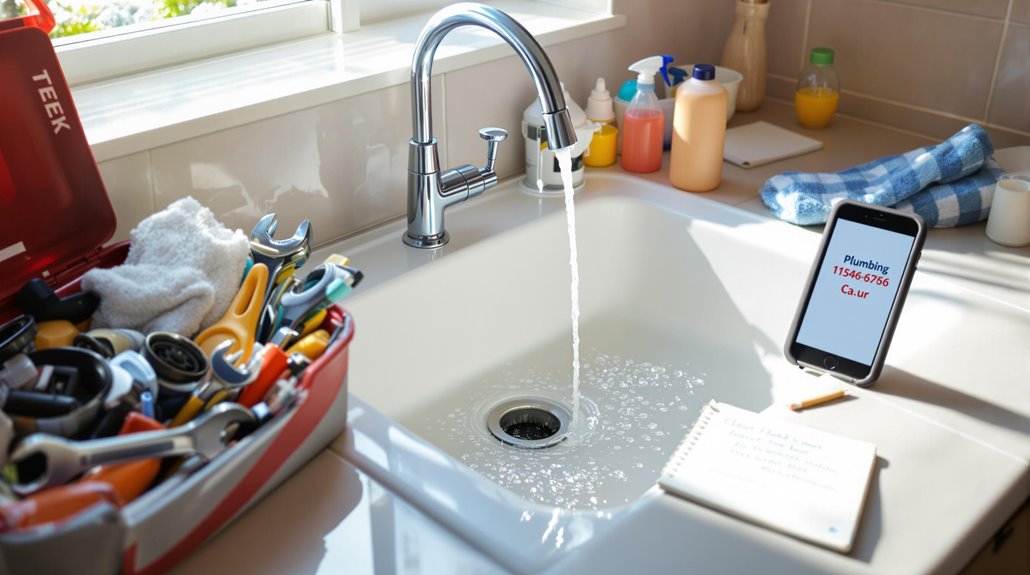
Before the plumber arrives, it's essential to gather fundamental information and take preliminary steps that can expedite the repair process. Start by creating a plumber checklist that includes details like the type of problem, location of the issue, and any relevant plumbing history. This information helps the plumber assess the situation quickly. Next, locate your emergency supplies, such as a bucket for leaks, towels for spills, and any necessary tools you might have. Clear the area around the plumbing issue to give the plumber easy access. Furthermore, make sure you can provide access to the main water shut-off valve if needed. Being prepared not only saves time but also promotes a smoother repair experience.
Cost Factors for Emergency Services
When you call an emergency plumber, it's important to be aware of the various cost factors that can influence your bill. Understanding the cost breakdown can help you make well-informed choices during a plumbing crisis. Here are three key factors to evaluate:
- Time of Service: Emergency calls during weekends or holidays usually incur higher rates because of limited service availability.
- Type of Issue: Complex problems, like sewer line backups, typically cost more to resolve than minor leaks.
- Labor and Materials: The rates for labor and the materials required for the repair can greatly affect the overall cost.
Preventative Measures for Homeowners
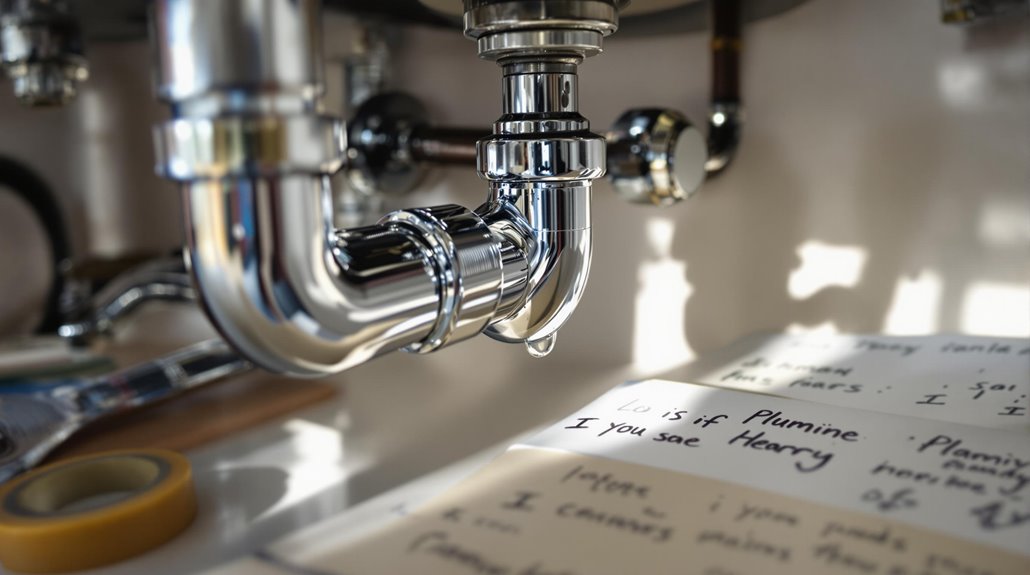
To prevent plumbing emergencies, homeowners should adopt a proactive approach to maintenance and inspections. Regular checks can help you spot potential issues before they escalate. Implementing routine maintenance, such as clearing drains and inspecting pipes, is essential. Furthermore, consider using leak detection systems to monitor water usage and identify leaks early on.
| Maintenance Task | Frequency |
|---|---|
| Inspect pipes | Quarterly |
| Clean gutters | Biannually |
| Flush water heater | Annually |
| Test leak detection | Monthly |
Conclusion
In plumbing, it's often said, "An ounce of prevention is worth a pound of cure." By recognizing signs of emergencies early and knowing when to call for help, you can save yourself from costly repairs and stress. Don't hesitate to reach out to an emergency plumber when needed, and always be prepared for potential issues. Taking proactive steps today guarantees a safer, more efficient plumbing system tomorrow. Stay vigilant, and keep your home's plumbing in top shape.
